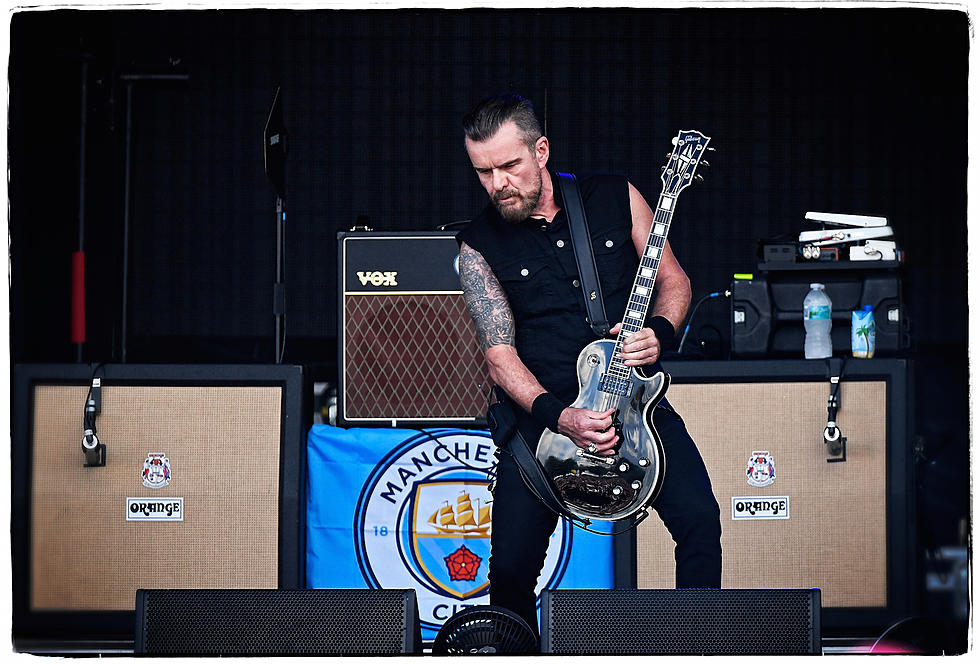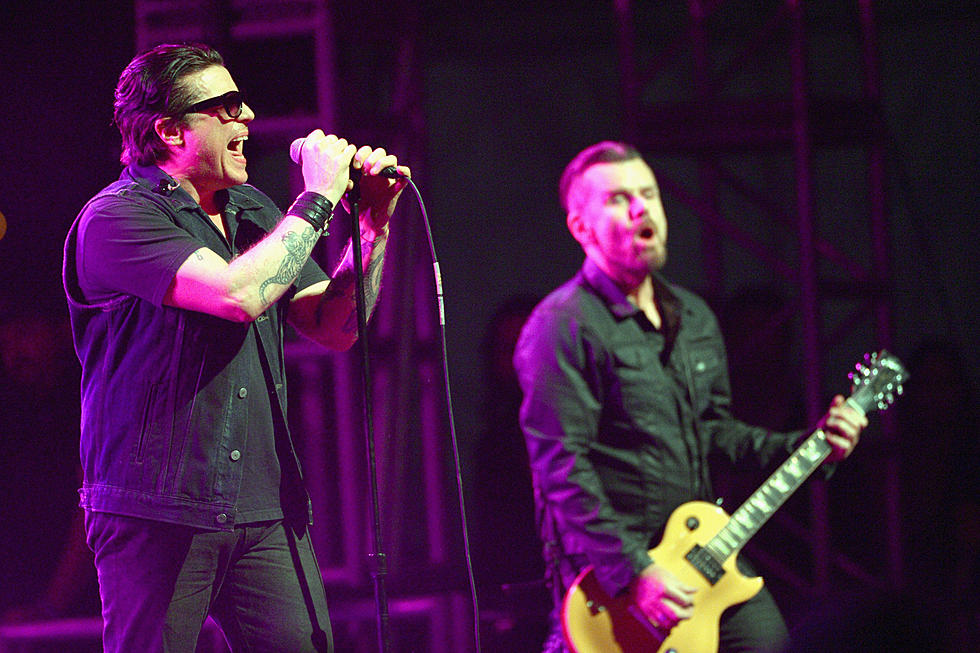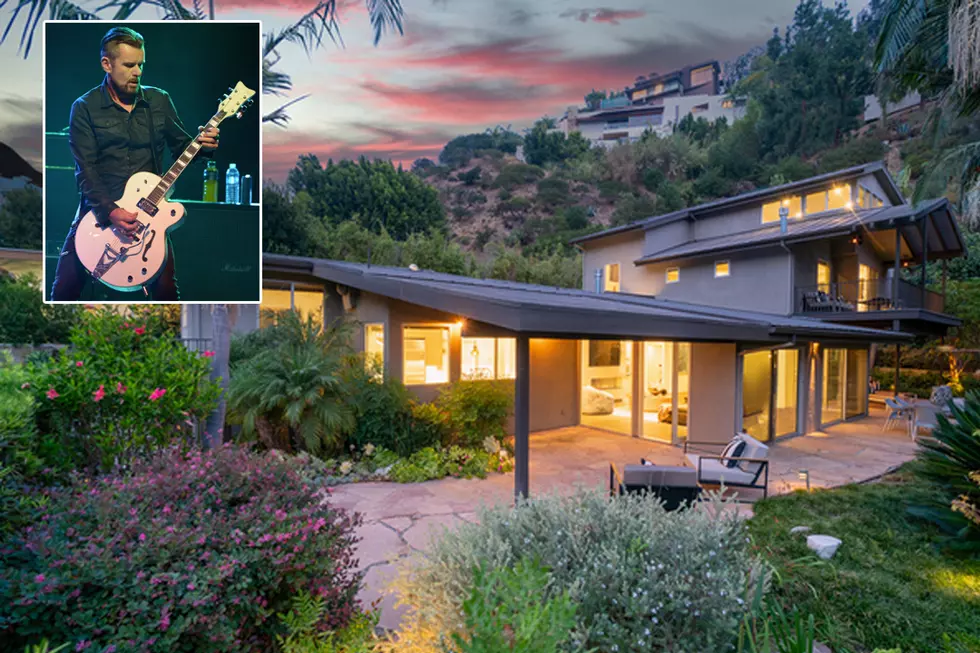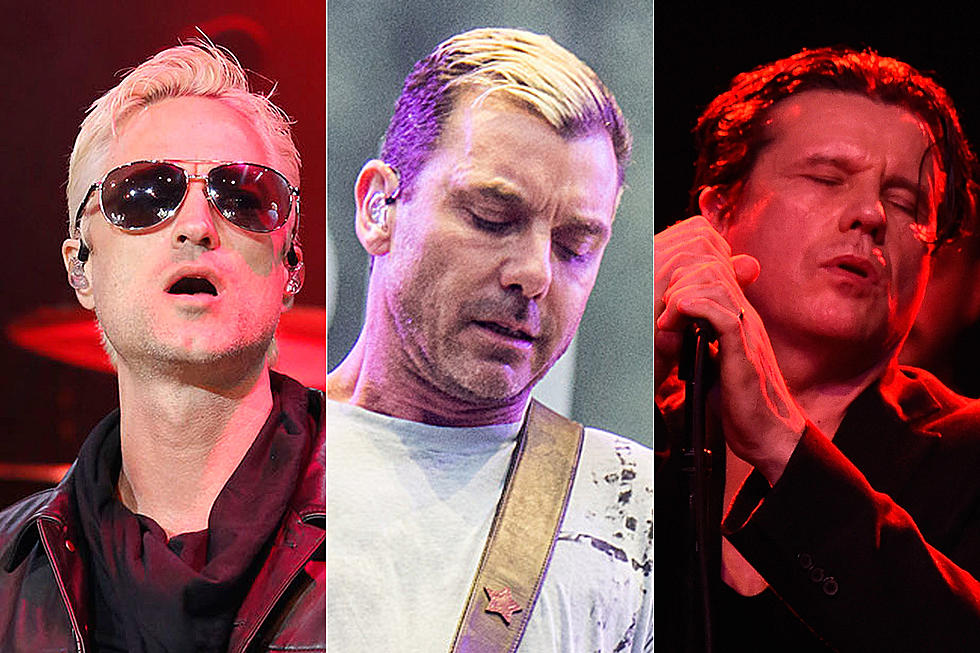
The Cult’s Billy Duffy Reflects on 30 Years of ‘Sonic Temple,’ Opening for Metallica
"Fire Woman," "Edie," "Sweet Soul Sister" -- these songs and more have stood the test of time, and this year they're part of The Cult's Sonic Temple 30th anniversary. The group is releasing a massive 30th anniversary box set today (Sept. 13) that delves deeper into one of the band's most beloved releases, showcasing demos and mixes, some live music and a few specialty promotional items dating back to 1989.
We had a chance to speak with The Cult guitarist Billy Duffy about the band's classic album, with the musician sharing stories behind the creation of the songs, discussing the creative process, sharing reflections from their touring and taking a chance on a promising young producer named Bob Rock.
Duffy also shares some of his favorite touring moments from The Cult's history and offers an update on their current recording plans. Check out the chat below.
I know you’ve said with this release, you’re happy that the music is now in the hands of the fans, but 30 years on, how do you relate to Sonic Temple? Does it feel the same as when you wrote it or does the feeling change over time?
That’s a good question. You know, there is that saying that “good is good,” and I think we had good songs. It was pretty much at the full flurry of the resurgence of long-haired rock, so for me personally, and I know to some extent for Ian [Astbury] as one of these ex-punk rock guys, it was really an opportunity to kind of explore a no holds barred rock album.
There was no, “Well we can’t go too rock.” There was music before the Sex Pistols and some of it had gotten very dreadful and we all know what the benefits of punk rock were. It was certainly tremendous for me and Ian as individuals. But I think that Sonic Temple is just a moment where we were like, “Let’s just put all that aside and let’s really just embrace and make the best rock album we can. “
And in its time, it was very timely. We recorded in the late summer of 1988 and worked on it off and on until the end of the year. That was the peak and everyone was pretty much rocking out at that point.
Seeing Ian's quote about being influenced by art, film, poetry and literature, I'm thinking this must have been just a great creative period for the band. At four albums in, did it kind of feel like you were painting with more colors in the palette and what were some of the conversations like concerning what you wanted to do with this album?
Yeah, well, it's been well publicized that the previous album Electric was great, but it was a difficult album for us to make because we basically recorded it once in England with the producer of the Love album, who we were very happy with and we'd gotten great results, but just somehow, and I don't know what happened -- we changed or something had happened, but we had done this album and to everybody's horror including ours, we just didn't think it was right.
It just wasn't where we wanted to be, so when Rick [Rubin] came in, he was the straw that we were clutching at because we had this album and we were terribly frustrated that we spent so much time and money and energy trying to make it good. But Rick came in, like Rick has proven to be, a pretty no-nonsense character, and we made Electric. But I think we left some of the stuff behind. We left some of the uniqueness of The Cult behind and Electric was part of the stuff. It was a great album and some people really love it, and it reflected the lifestyle we were living at the time, which was somewhat cartoony and piratey and crazy.
But once we achieved that and done that and got more established in America and were being taken a bit more seriously, I think we wanted to make a slightly more serious album and that was Sonic Temple.
Moving onto Sonic Temple, Bob Rock is well known these days as a top producer, but was still kind of making his name when you worked with him. I know the connection came through you. What were you looking for in this album and what made Bob the right guy?
For purely selfish reasons, I knew Bob and I bonded pretty much on '70s English guitar players and we were totally obsessing on that period. It's no secret that when it comes to rock music, guitar is the thing. We acknowledged that with the album cover of Sonic Temple, electric guitar is the tool for rock music. It is the altar at which you must bow. You've got to get the guitars right and that's really what Bob wanted to help me with.
I need to explain this, but when we went in to do Electric, I basically made that whole album with some rented guitars and no effects and I was kind of put on the spot to re-imagine all the riffs that I'd already done on one record somewhat unsuccessfully. I went through a bit of trauma where I felt like I was put on the spot to become a very different guitar player than the one who had made the Love album. It was necessary, but it was traumatic, so in the end I felt that with Sonic Temple I really wanted a producer who could really help me fully explore the guitar stuff.
In retrospect, it might have gotten a little indulgent, I don't know. But that was the goal and I had a lot of confidence in Bob and I've got rapport with him.
I have to say I always have loved the guitar tone on this album...
Well, thank you. There was an intention there with Bob even though he was a non-tried producer, he had engineered and nobody knew he was going to blow up to the extent that he did. But at the time, I felt very confident in him and he had a very clear vision, and being Canadian, he had somewhat of an understanding of the British music scene, and he wasn't coming at it from an American perspective in terms of rock, so we got some of the nuances and subtleties that we like to think is embodied in English rock music. There are some of those little subtle flavors that differentiate it. So we felt it was a great balance, but he was a gamble. It was definitely a gamble using Bob at the time.
You discuss the importance of guitars, but the drummer situation on this album is quite interesting with Eric Singer and Chris Taylor in at the demo stage, Mickey Curry recording the album and Matt Sorum being the touring drummer. Some well respected names there, but I wanted to get your take on how it turned out for the band on the record and taking it out live.
Great question, because the second thing you got to with rock music, and I don't want to offend keyboard players, bass players or even lead singers although, you know, that's easy to do, but once you've got your guitar down in a rock band, you need the drums. You need the beat. That's the "roll" in rock and roll. It's from below the waist, and that's how I sort of differentiate blues based hard rock music from metal. Metal to me aims from the waist up, and you go from the waist down with hard rock, rock and roll and anything with the blues in it.
You need that swing and Bob was very adamant about that with the drummer. He knew Mickey Curry from working with Bryan Adams. I think Bob had engineered or had the same manager as Bryan Adams and he knew Mickey and his background prior to Bryan Adams was Hall & Oates.
I think just doing the demo process with Eric Singer, who is a great drummer, but Bob just didn't feel he was quite right for our songs. Chris Taylor was actually the drummer in Bob's band. I think he just helped us out, but Mickey Curry was the guy that Bob was quite strident about. He felt the album had to be built on very solid rhythmical foundations to give it the kind of spring and the life that we were hoping to get and not just make it another bash-bash-bash rock album.
Definitely wanted to hit on "Edie," which is a favorite, but also gave you a chance to incorporate a string arrangement from Bob Buckley that really stands out.
It was crazy. Bob Rock got really into it. He was like, "Right, we're gonna do this and we're gonna hire eight cellists." We actually laid the basic rhythm and the backing track with the cellists live. We used two studios in Vancouver. It was great, and just to do it analog and really old fashioned. It brought a great deal of excitement to it. It was very intense trying to get it as they were just regular orchestral cello players. They showed up, got a bit of sheet music, bashed it out and just waited for the rock stars to make mistakes.
Around this time, you also got to tour with Iggy Pop and he also appears on the album on "New York City."
Yeah, it was cool of Iggy to sing on the record. It's a true story that Ian rode Iggy on the back of his bike from a gig to the studio. Iggy played in Vancouver and I played on "I Wanna Be Your Dog," and Ian got Iggy on the back of his Harley and took him to the studio and they did a late session doing that track "New York City."
I know the cliches of "they're all our babies and we love them equally," but from Sonic Temple do you find that there are songs off the album that meant something more to you and stood out over the years?
That's a fair question. I kind of like "American Horse." That's one that Ian and I can both agree that is really good. I think that if anything, my only criticism of what we did was that it was perhaps a little too layered sound-wise, like we just threw in another kitchen sink on top of the other kitchen sink. But in retrospect, I think that one 30 years later [stands out]. But also, sometimes I think the songs got quite long. It wasn't an intentional thing. It just seemed that that's how they turned out.
But "American Horse," and "Soul Asylum" is a pretty cool song. That one seems to have a lot of impact, now, today, playing that song. The singles obviously get more attention because they're better known, but in terms of our deeper cuts, "American Horse" and "Soul Asylum" are the ones I look forward to.
Looking at the 30th Anniversary Sonic Temple package, it is packed. Radio promos, old press releases, laminates, demos and mixes, some live music -- are there certain things you're happy have been included?
I'm at a stage in my life and career where I'm really happy. The music is really for the fans now. At this point, any Cult fan has been a very committed person. Some of the stuff is a little embarrassing, the demo stuff, but it is the formative stuff and I think it's a great compliment that anyone even cares to explore where did that song idea come from.
Plus there's some of the things that didn't make it. As a songwriter, sometimes I lay awake at night thinking did we miss a killer riff? Did circumstances just stop another great song from getting out?
I cannot stress, I just really want the fans to have a full Sonic Temple experience. This is it and it's pretty much everything we've got. I know Ian pulled a couple of demos that were just really uncomfortable for him and there was no upside for those being on it for his personal point of view and that's his prerogative, but I would say a good 95 percent of what we did is there.
I know this was a relentless tour for the band and you had to deal with a lot of stress that came with lots of dates and a brighter spotlight. Any reflections from this tour run and is there any advice you might give to younger bands of how to deal with it all?
It's very different now. The only advice I could ever give is to just try to stay in love with making music and try to enjoy it as much as possible. The challenge is to remain in love with music -- making it, playing it, the whole process.
The touring, at the time, that's what you did. There was just a well run path of recording your album, you go on tour in North America, release your first single and video, go on tour supporting a big act in an arenas, you try to impress everybody with how good you are, then you come back around several months later to the same cities and your'e the headliner and hopefully you play bigger places than you would've done.
Our introduction, fortunately on Sonic Temple, was Metallica's crowd. The only two tours we were offered were Metallica or Ozzy Osbourne, and we thought Ozzy's crowd would be very Sabbath-Ozzy centric while Metallica were a young band, same age as us and we know they're heavy, but it was an interesting tour. I went to see places in America I've never been back to since and had a lot of fun, but that was a tough one because it was the old Metallica, the pre-Black Album Metallica.
While this is a popular album for the band, just wanted to get your thoughts on your favorite album and tour cycle within The Cult from a personal and professional perspective.
A lot of that can come down to how much fun you have socially. I really enjoyed Beyond Good and Evil with Matt Sorum back in the band on a personal level. But it was somewhat tragically cut short by 9/11, but that period was fun and people might not necessarily think that.
It's hard for me to differentiate from 1984 up until about 1991. Ceremony was a tough album for us, but the tour was a lot of fun. Lenny Kravitz was the special guest on the tour and we went down to South America and played in Argentina at a soccer stadium. It was great and we were carrying on with the momentum from Sonic Temple, but it was saddened in a way because Jamie Stewart had left the band. He kind of retired and Matt Sorum joined Guns N' Roses. But they've all got a story and they were fun.
I'll tell you a brilliant tour. In 1994, we did the Big Day Out in Australia and the bands on the bill were Ministry, Primal Scream, Hole, You Am I -- an Australian band, Silverchair when they were still children, a little Australian Nirvana band and the Screaming Trees. That was a fun tour to be on. That was one of my most enjoyable tours to be on. Just the schedule and getting a chance to hang out with all the band guys, that was a good one.
For the time being you're promoting the Sonic Temple 30th anniversary, but I should ask if there's anything else on the horizon for the group at this point.
We are always in the business of trying to write new music, but when you have two songwriters and we don't write individual songs, we're trying to collaborate, we kind of have to find the common ground always. It's a fascinating dance, because when you're an adult you have lives and children and houses and you don't spend the intense time together you do when you're 20 in the back of a tour bus, so just even getting the right sort of sonic creative space is a fun challenge.
We're always up for a challenge and if we get anything we feel is good enough to put out, we'll do it. We're always looking to try to do it and we're very much right now actively involved in trying to come up with some new music, but one thing is quality and not quantity. No one wants to put music out just for the sake of it.
Thanks to The Cult's Billy Duffy for the interview. The 'Sonic Temple' 30th Anniversary box set is currently available to purchase here. You can also catch the band celebrating the anniversary on tour at these stops.
Top 80 Hard Rock + Metal Albums of the '80s
More From WGBF-FM










